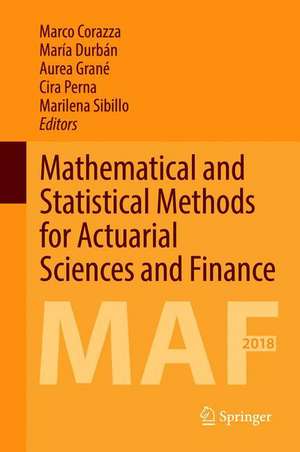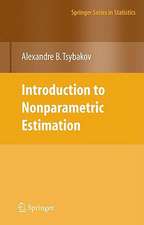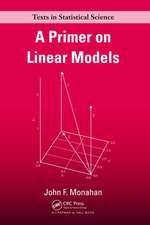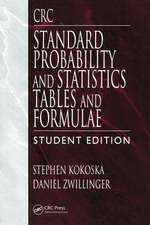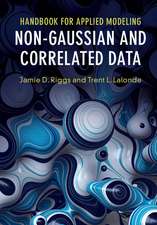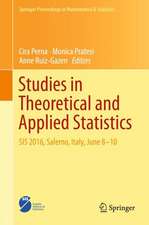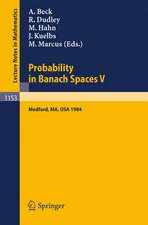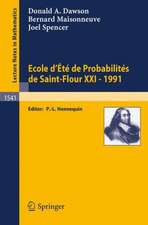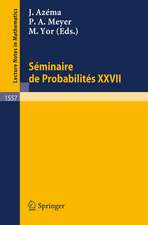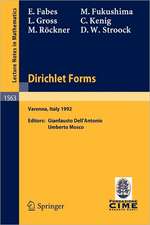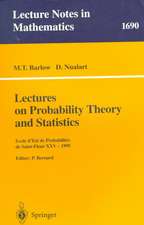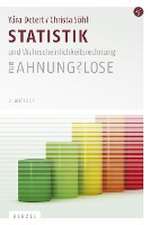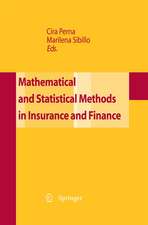Mathematical and Statistical Methods for Actuarial Sciences and Finance: MAF 2018
Editat de Marco Corazza, María Durbán, Aurea Grané, Cira Perna, Marilena Sibilloen Limba Engleză Hardback – 26 iul 2018
The book covers a wide variety of subjects in actuarial science and financial fields, all discussed in the context of the cooperation between the three quantitative approaches. The topics include: actuarial models; analysis of high frequency financial data; behavioural finance; carbon and green finance; credit risk methods and models; dynamic optimization in finance; financial econometrics; forecasting of dynamical actuarial and financial phenomena; fund performance evaluation; insurance portfolio risk analysis; interest rate models; longevity risk; machine learning and soft-computing in finance; management in insurance business; models and methods for financial time series analysis, models for financial derivatives; multivariate techniques for financial markets analysis; optimization in insurance; pricing; probability in actuarial sciences, insurance and finance; real world finance; risk management; solvency analysis; sovereign risk; static and dynamic portfolio selection and management; trading systems.
This book is a valuable resource for academics, PhD students, practitioners, professionals and researchers, and is also of interest to other readers with quantitative background knowledge.
| Toate formatele și edițiile | Preț | Express |
|---|---|---|
| Paperback (1) | 1391.52 lei 6-8 săpt. | |
| Springer International Publishing – 8 feb 2019 | 1391.52 lei 6-8 săpt. | |
| Hardback (1) | 1397.68 lei 6-8 săpt. | |
| Springer International Publishing – 26 iul 2018 | 1397.68 lei 6-8 săpt. |
Preț: 1397.68 lei
Preț vechi: 1704.49 lei
-18% Nou
Puncte Express: 2097
Preț estimativ în valută:
267.53€ • 290.70$ • 224.87£
267.53€ • 290.70$ • 224.87£
Carte tipărită la comandă
Livrare economică 21 aprilie-05 mai
Preluare comenzi: 021 569.72.76
Specificații
ISBN-13: 9783319898230
ISBN-10: 331989823X
Pagini: 520
Ilustrații: XVI, 518 p.
Dimensiuni: 155 x 235 mm
Greutate: 0.92 kg
Ediția:1st ed. 2018
Editura: Springer International Publishing
Colecția Springer
Locul publicării:Cham, Switzerland
ISBN-10: 331989823X
Pagini: 520
Ilustrații: XVI, 518 p.
Dimensiuni: 155 x 235 mm
Greutate: 0.92 kg
Ediția:1st ed. 2018
Editura: Springer International Publishing
Colecția Springer
Locul publicării:Cham, Switzerland
Cuprins
1 M. Caporin, G. Bonaccolto and S. Paterlini, Conditional Autoregressive Quantile-Located Value-at-Risk.- 2 M. Galeotti, G. Rabitti and E. Vannucci, The Rearrangement algorithm of Puccetti and Rüschendorf: proving the convergence.- 3 R. Cesari and V. Mosco, Optimal Management of Immunized Portfolios.- 4 E. Russo, M. Costabile and I. Massabo, Evaluating variable annuities with GMWB when exogenous factors influence the policy-holder withdrawals.- 5 A. Jokiel-Rokita and R. Magiera, Estimation and prediction for the modulated power law process.- 6 M. De La O González and F. Jareño, Extensions of Fama and French models.- 7 A. Hitaj, L. Mercuri and E. Rroji, Stochastic mortality modelling: some extensions based on Lévy CARMA models.- 8 L. Ballester, R. Fernández and A. González-Urteaga, An empirical analysis of the lead lag relationship between the CDS and stock market: Evidence in Europe and US.- 9 I.L. Amerise, Automatic detection and imputation of outliers in electricity price time series.- 10 F. Giordano, M. Niglio and M. Restaino, Variable selection in estimating bank default.- 11 F. Jareño, M.Á. Medina, M. Tolentino and M. De La O González, European Insurers: Interest Rate Risk Management.- 12 M. Corazza and C. Nardelli, Comparing possibilistic portfolios to probabilistic ones.- 13 M. Maggi and P. Uberti, Google searches for portfolio management: a risk and return analysis.- 14 M.C. Schisani, M.P. Vitale and G. Ragozini, Financial Networks and Mechanisms of Business Capture in Southern Italy over the First Global Wave (1812-1913). A Network Approach.- 15 H. Gzyl, S. Mayoral and E. P. Gomes, Loss data analysis with maximum entropy.- 16 I.D.Fabián, P. Devolder, J. A. Herce and F. Del Olmo, A two-steps mixed pension system: An aggregate analysis.- 17 D. Atance and E. Navarro, A Single Factor Model for Constructing Dynamic Life Tables.- 18 L. Sanchis, J.M. Montero and G. Fernández-Avilés, Downside risk co-movement in commodity markets during distress periods. A Multidimensional scaling approach.- 19 G. Caivano and S. Bonini, Probability of Default Modeling: A Machine Learning Approach.- 20 S. Corsaro, V. De Simone, Z. Marino and F. Perla, Numerical solution of the regularized portfolio selection problem.- 21 N. Ahlgren and P. Catani, Practical Problems with Tests of Cointegration Rank with Strong Persistence and Heavy-Tailed Errors.- 22 M. De La O Gonzalez, F. Jareño and C. El Haddouti Ben Ali, The Islamic Financial Industry. Performance of Islamic vs. conventional sector portfolios.- 23 L. Invernizzi and V. Magatti, Could Machine Learning predict the Conversion in Motor Business?.- 24 S. Albosaily and S. Pergamenshchikov, The optimal investment and consumption for financial markets generated by the spread of risky assets for the power utility.- 25 M.E. De Giuli, M. Neffelli and M. Resta, An Integrated Approach to Explore the Complexity of Interest Rates Network Structure.- 26 I. Fuente, E. Navarro and G. Serna, Estimating regulatory capital requirements for reverse mortgages. An international comparison .- 27 L. Gómez-Valle and J. Martínez-Rodríguez, Real-world versus neutral risk measures in the estimation of an interest rate model with stochastic volatility.- 28 G. Apicella, M. Dacorogna, E. Di Lorenzo and M. Sibillo, Improving Lee-Carter forecasting: methodology and some results.- 29 V. D’amato, A. Diaz, E. Di Lorenzo, E. Navarro and M. Sibillo, What if two different interest rates datasets allow for discribing the same financial product?.- 30 V. D'Amato, E. Di Lorenzo, M. Sibillo and R. Tizzano, Money purchase” pensions: contract proposals and risk analysis.- 31 K. Colaneri, S. Herzel and M. Nicolosi, The value of information for optimal portfolio management.- 32 N. Loperfido, Kurtosis Maximization for Outlier Detection in GARCH Models.- 33 A. Berti and N. Loperfido, An Extension of Multidimensional Scaling to Several Distance Matrices, and its Application to the Italian Banking Sector.- 34 C. Franceschini, Exploratory Projection Pursuit for Multivariate Financial Data.- 35 I. Albarrán Lozano, P. J. Alonso-González and A. Grané, Using deepest dependency paths to enhance life expectancy estimation.- 36 L. Rossini, M. Billio and R. Casarin, Bayesian nonparametric sparse Vector Autoregressive models.- 37 P. Angulo, V. Gallego, D. Gómez Ullate and P. Suárez, Bayesian Factorization Machines for Risk Management and Robust Decision Making.- 38 M. Coppola, M. Russolillo and R. Simone, Risk and Uncertainty for Flexible Retirement Schemes.- 39 G. Giordano, S. Haberman and M. Russolillo, Empirical Evidence from the Three-way LC model.- 40 A. Diaz and G. Garrido Sanchez, Socially Responsible Ratings and Financial Performance.- 41 M. Bernardi and M. Costola, Sparse causality networks through regularised regressions.- 42 J. Iñaki De La Peña and N. Peña-Miguel, A Basic Social Pension for Everyone?.- 43 M.C. Fernandez-Ramos, J. Iñaki De La Peña, A. T. Herrera, I. Iturricastillo and N.Peña-Miguel, HelpingLong Term Care coverage via differential on mortality?.- 44 N. Peña-Miguel, M.C. Fernández-Ramos and J. Iñaki De La Peña, A minimum pension for older people via expenses rate.- 45 S. Bonini and G. Caivano, Risk/Return analysis on credit exposure: do small banks really apply a pricing risk-based on their loans?.- 46 M. Pacella, F. Giordano and M.L. Parrella, Multiple testing for different structures of Spatial Dynamic Panel Data models.- 47 M. Billio, R. Casarin, M. Costola and L. Frattarolo, Disagreement in Signed Financial Networks.- 48 M. González-Fernández and C. González-Velasco, Do Google trends help to forecast sovereign risk in Europe?.- 49 F. Battaglia, D. Cucina and M.l Rizzo, Periodic autoregressive models with multiple structural changes by genetic algorithms.- 50 G. Albano, M. La Rocca and C. Perna, Small Sample Analysis in Diffusion Processes: a Simulation Study.- 51 M. Corazza and C. Pizzi, Some critical insights on the unbiased efficient frontier à la Bodnar& Bodnar.- 52 G. De Luca, G. Rivieccio and S. Corsaro, A copula-based quantile model.- 53 M. Billio, R. Casarin and M. Iacopini, Bayesian Tensor Binary Regression.- 54 F. Baione, D. Biancalana, P. De Angelis and I. Granito, Dynamic policyholder behaviour and surrender option evaluation for life insurance.- 55 A. Amendola, M. Braione, V. Candila and G. Storti, Combining multivariate volatility models.- 56 A. Bernardi and M. Bernardi, Two–Sided Skew and Shape Dynamic Conditional Score Models.- 57 F. Baione, D. Biancalana, P. De Angelis and I. Granito, An individual risk model for premium calculation based on quantile: a comparison between Generalized Linear Models and Quantile Regression.- 58 A. Díaz and C. Esparcia, Time-varying risk aversion. An application to European optimal portfolios.- 59 E. Boj Del Val and T. Costa Cor, Logistic classification for new policyholders taking into account prediction error.- 60 A. Caner Turkmen and A. Taylan Cemgil, Modeling High-Frequency Price Datawith Bounded-Delay Hawkes Processes.- 61 F. Bartolucci, A. Cardinali and F. Pennoni, A generalized moving average convergence/divergence for testing semi-strong market efficiency.- 62 L. Crosato, L. Grossi and F. Nan, Forecasting the volatility of electricity prices by robust estimators: an application to the Italian market.- 63 D. Curcio, N. Borri, R. Cerrone and R. Cocozza, Life insurers’ asset-liability dependency and low-interest-rate environment.- 64 M. Guillen and A. M. Pérez-Marín, The Contribution of Usage-based Data Analytics to benchmark Semi-autonomous Vehicle Insurance.- 65 P. Abad, A. Díaz, A. Escribano and M.D. Robles, The effect of rating contingent guidelines and regulation around credit rating news.- 66 P. Peinado, Disability Pensions in Spain: A Factor to Compensate Life-Time Losses.- 67 D. De Gaetano and M. Braione, Transmission of prices and price volatility in Australian electricity spot markets: A MGARCH-based forecast comparison.- 68 D. Barro, Optimal portfolio selection integrating non-financial criteria.- 69 R. Cerqueti, M. Giacalone and D. Panarello, A Generalized Error Distribution-based method for Conditional Value-at-Risk evaluation.- 70 M. Bernardi and P. Stolfi, Robust time-varying undirected graphs.- 71 J.L. Vilar-Zanón and O. Peraita-Ezcurra, Pricing illiquid assets by entropy maximization through linear goal programming.- 72 R. Casarin, M. Billio and M. Iacopini, Bayesian Tensor Regression Models.- 73 M. Bernardi and P. Stolfi, Approximate EM algorithm for sparse estimation of multivariate location--scale mixture of normal. 74 I. Albarrán Lozano, P. J. Alonso-González and J. De Vicente Maldonado, Links between mortality rates and economic activity: a DFM approach.- 75 C. De Rosa, E. Luciano and L. Regis, Geographic diversification in annuity portfolios.- 76 U. Fiore, Z. Marino, F. Perla, S. Scognamiglio and P. Zanetti, Tuning a Deep Learning Network on Solvency II: Preliminary Results.- 77 G. Albano and V. Giorno,Inference in a Non-Homogeneous Vasicek-Type Model.- 78 D. Arzu and G M. Mantovani, Research Project MAF: A Bank Specific Integrated Rating.- 79 G. Piscopo, A comparative analysis of neuro fuzzy infer-ence systems for mortality prediction.- 80 F. Gannon, F. Legros and V. Touze, Automatic Balancing Mechanisms in Practice: What lessons for pension policy makers?.- 81 A.R. Bacinello and I. Zoccolan, Variable Annuities with State-Dependent Fees.- 82 A. Masson, The challenges of wealth and its intergenerational transmission in an aging society.- 83 L. Catania, F. Ravazzolo and S. Grassi, Quantitative Risk Management for Cryptocurrencies.- 84 J. Lledo Benito, J. M. Pavía Miralles and F. G. Morillas Jurado, The Level Mortality in Insured Population.- 85 I. Chatterjee, M. Hao, A. Macdonald, P. Tapadar and R. Guy Thomas, When is utilitarian welfare higher under insurance risk pooling?.- 86 D. Cortes-Sanchez and P. Soriano-Felipe, Forecasting the Equity Risk Premium in the European Monetary Union.- 87 D. Cortes-Sanchez and P. Soriano-Felipe, Statistical learning algorithms to forecast the equity risk premium in the European Monetary Union.- 88 M.F. Carfora, F. Martinelli, F. Mercaldo, A. Orlando and A. Yautsiukhin, Cyber risk management: a new challenge for actuarial mathematics.- 89 I. Albarrán Lozano, A. Benchimol, P.J. Alonso-González and J.M. Marín Diazaraque, Model assembling methodologies: a new model uncertainty approach in mortality projection.
Notă biografică
Marco Corazza has a PhD in "Mathematics for the Analysis of Financial Markets" and is an associate professor at the Department of Economics of the Ca' Foscari University of Venice (Italy). His main research interests include static and dynamic portfolio management theories; trading system models; machine learning applications in finance; bio-inspired optimization techniques; multi-criteria methods for economic decision support; port scheduling models and algorithms; and non-standard probability distributions in finance. He has participated in several research projects, at both the national and international level, and is the author/coauthor of one hundred and twenty scientific publications, some of which have received national and international awards. He is also editor-in-chief of the international scientific journal "Mathematical Methods in Economics and Finance", and is a member of the scientific committees of several conferences and of some private companies. His combines his academic activities with consulting services.
María Durbán is a professor of Statistics at Universidad Carlos III de Madrid (Spain). Her main areas of research are non-parametric regression, smooth mixed models and regression models for spatio-temporal data. She has numerous publications in these topics and their application in areas such as epidemiology, economics, and environmental sciences. She has been part of many scientific committees of international conferences.
Aurea Grané is a professor of Statistics at Universidad Carlos III de Madrid (Spain). Her research interests are mainly in goodness-of-fit, multivariate techniques for mixed-type data, functional data analysis and she has published numerous papers on these topics in international journals. She has been a member of several scientific committees of international conferences, and was co-director of the Master in Quantitative Techniques for the Insurance Sector and vice-director of the Department of Statistics at Universidad Carlos III de Madrid.
Cira Perna is a professor of Statistics and head of the Department of Economics and Statistics, University of Salerno (Italy). Her research mainly focuses on non-linear time series, artificial neural network models and resampling techniques, and she has published numerous papers on these topics in national and international journals. She has been a member of several scientific committees of national and international conferences.
Marilena Sibillo is a professor of Mathematical Methods for Economics, Finance and Actuarial Sciences at the University of Salerno (Italy). She has several international editing engagements and is the author of over a hundred publications. Her research interests are mainly in longevity risk in life contracts, de-risking strategies, personal pension products and mortality forecasting.
María Durbán is a professor of Statistics at Universidad Carlos III de Madrid (Spain). Her main areas of research are non-parametric regression, smooth mixed models and regression models for spatio-temporal data. She has numerous publications in these topics and their application in areas such as epidemiology, economics, and environmental sciences. She has been part of many scientific committees of international conferences.
Aurea Grané is a professor of Statistics at Universidad Carlos III de Madrid (Spain). Her research interests are mainly in goodness-of-fit, multivariate techniques for mixed-type data, functional data analysis and she has published numerous papers on these topics in international journals. She has been a member of several scientific committees of international conferences, and was co-director of the Master in Quantitative Techniques for the Insurance Sector and vice-director of the Department of Statistics at Universidad Carlos III de Madrid.
Cira Perna is a professor of Statistics and head of the Department of Economics and Statistics, University of Salerno (Italy). Her research mainly focuses on non-linear time series, artificial neural network models and resampling techniques, and she has published numerous papers on these topics in national and international journals. She has been a member of several scientific committees of national and international conferences.
Marilena Sibillo is a professor of Mathematical Methods for Economics, Finance and Actuarial Sciences at the University of Salerno (Italy). She has several international editing engagements and is the author of over a hundred publications. Her research interests are mainly in longevity risk in life contracts, de-risking strategies, personal pension products and mortality forecasting.
Textul de pe ultima copertă
The interaction between mathematicians, statisticians and econometricians working in actuarial sciences and finance is producing numerous meaningful scientific results. This volume introduces new ideas, in the form of four-page papers, presented at the international conference Mathematical and Statistical Methods for Actuarial Sciences and Finance (MAF), held at Universidad Carlos III de Madrid (Spain), 4th-6th April 2018.
The book covers a wide variety of subjects in actuarial science and financial fields, all discussed in the context of the cooperation between the three quantitative approaches. The topics include: actuarial models; analysis of high frequency financial data; behavioural finance; carbon and green finance; credit risk methods and models; dynamic optimization in finance; financial econometrics; forecasting of dynamical actuarial and financial phenomena; fund performance evaluation; insurance portfolio risk analysis; interest rate models; longevity risk; machine learning and soft-computing in finance; management in insurance business; models and methods for financial time series analysis, models for financial derivatives; multivariate techniques for financial markets analysis; optimization in insurance; pricing; probability in actuarial sciences, insurance and finance; real world finance; risk management; solvency analysis; sovereign risk; static and dynamic portfolio selection and management; trading systems.
This book is a valuable resource for academics, PhD students, practitioners, professionals and researchers, and is also of interest to other readers with quantitative background knowledge.
The book covers a wide variety of subjects in actuarial science and financial fields, all discussed in the context of the cooperation between the three quantitative approaches. The topics include: actuarial models; analysis of high frequency financial data; behavioural finance; carbon and green finance; credit risk methods and models; dynamic optimization in finance; financial econometrics; forecasting of dynamical actuarial and financial phenomena; fund performance evaluation; insurance portfolio risk analysis; interest rate models; longevity risk; machine learning and soft-computing in finance; management in insurance business; models and methods for financial time series analysis, models for financial derivatives; multivariate techniques for financial markets analysis; optimization in insurance; pricing; probability in actuarial sciences, insurance and finance; real world finance; risk management; solvency analysis; sovereign risk; static and dynamic portfolio selection and management; trading systems.
This book is a valuable resource for academics, PhD students, practitioners, professionals and researchers, and is also of interest to other readers with quantitative background knowledge.
Caracteristici
Offers selected peer-reviewed papers Focuses on mathematical and statistical methods in actuarial sciences and finance Intended for academicians, researchers, Ph.D. students and professionals
